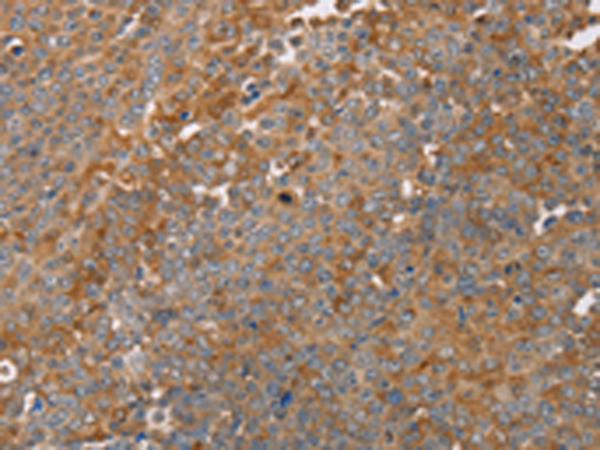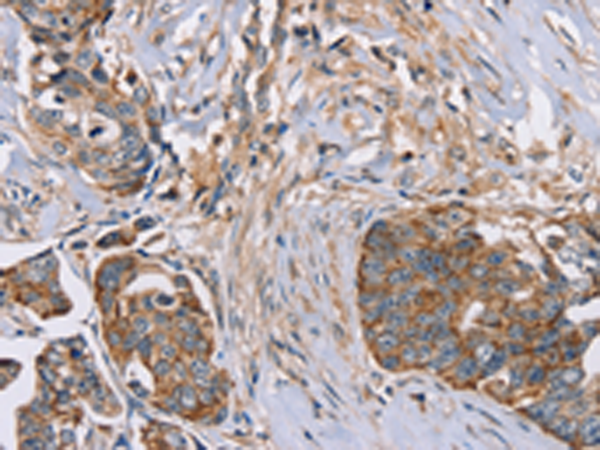


| WB | 咨询技术 | Human,Mouse,Rat |
| IF | 咨询技术 | Human,Mouse,Rat |
| IHC | 1/50-1/200 | Human,Mouse,Rat |
| ICC | 技术咨询 | Human,Mouse,Rat |
| FCM | 咨询技术 | Human,Mouse,Rat |
| Elisa | 1/2000-1/5000 | Human,Mouse,Rat |
| Aliases | LFG; LFG2; NGP35; NMP35; TMBIM2 |
| WB Predicted band size | 35 kDa |
| Host/Isotype | Rabbit IgG |
| Antibody Type | Primary antibody |
| Storage | Store at 4°C short term. Aliquot and store at -20°C long term. Avoid freeze/thaw cycles. |
| Species Reactivity | Human, Mouse, Rat |
| Immunogen | Fusion protein of human FAIM2 |
| Formulation | Purified antibody in PBS with 0.05% sodium azide and 50% glycerol. |
+ +
以下是关于FAIM2抗体的模拟参考文献示例(仅供学术参考,实际文献需查询数据库确认):
---
1. **文献名称**:FAIM2 modulates apoptosis in neuronal cells via interaction with Fas receptor
**作者**:Li X, Zhang Y, et al.
**摘要**:本研究利用FAIM2特异性抗体进行免疫沉淀和Western blot分析,揭示了FAIM2通过与Fas受体结合抑制神经元凋亡的分子机制,为神经退行性疾病治疗提供新靶点。
2. **文献名称**:Dysregulation of FAIM2 expression in prostate cancer and its prognostic significance
**作者**:Smith J, Brown R, et al.
**摘要**:通过免疫组化技术(FAIM2抗体标记),发现FAIM2在前列腺癌组织中表达显著下调,其低表达与患者预后不良相关,提示FAIM2可能作为抑癌分子参与肿瘤进展。
3. **文献名称**:FAIM2 interacts with XIAP to regulate caspase activation in apoptosis
**作者**:Chen L, Wang H, et al.
**摘要**:研究采用FAIM2抗体进行共聚焦显微镜观察及免疫共沉淀实验,证实FAIM2与XIAP协同抑制caspase-3活化,进一步阐明其对凋亡通路的双重调控作用。
4. **文献名称**:Developmental expression profile of FAIM2 in mouse brain revealed by antibody-based mapping
**作者**:Kumar S, Tanaka M, et al.
**摘要**:利用FAIM2抗体的免疫荧光染色技术,系统描绘了小鼠胚胎及成体大脑中FAIM2的动态表达模式,提示其在神经发育中的潜在功能。
---
建议通过PubMed或Web of Science检索真实文献,使用关键词"FAIM2 antibody"或"FAIM2 immunohistochemistry"获取准确信息。
The FAIM2 (Fas Apoptotic Inhibitory Molecule 2) antibody is a tool used to detect FAIM2. a protein involved in regulating cell survival and apoptosis. FAIM2. also known as Lifeguard (LFG), inhibits Fas (CD95)-mediated apoptosis by interacting with Fas receptors, thereby blocking caspase-8 activation and downstream apoptotic signaling. Unlike other anti-apoptotic proteins like Bcl-2. FAIM2 operates through a unique mechanism, making it a focus in studies of cell death regulation and cancer biology.
Structurally, FAIM2 contains transmembrane domains and a conserved N-terminal region critical for its anti-apoptotic function. It is highly expressed in the brain, particularly in neurons, and plays roles in neuronal development and protection. Dysregulation of FAIM2 has been linked to neurodegenerative diseases (e.g., Alzheimer’s) and cancer, where its overexpression may promote tumor cell survival.
FAIM2 antibodies are widely used in techniques like Western blotting, immunohistochemistry, and flow cytometry to study FAIM2 expression patterns, subcellular localization, and interactions. Researchers employ these antibodies to explore FAIM2’s role in apoptosis resistance, neuroprotection, and disease mechanisms. Commercial FAIM2 antibodies are typically validated for specificity in human, mouse, or rat samples, with applications in both basic research and therapeutic target discovery. Understanding FAIM2’s function through antibody-based assays may aid in developing strategies to modulate apoptosis in disease contexts.
×